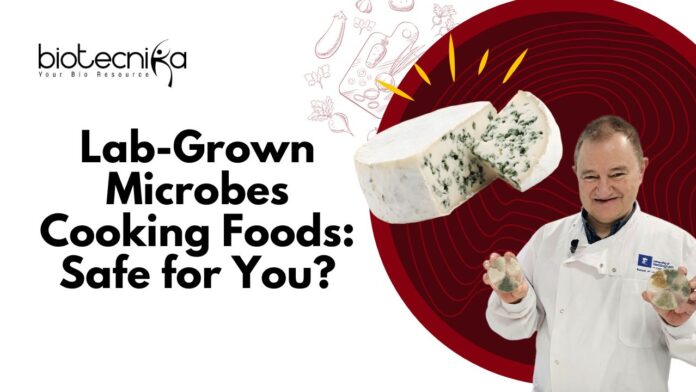Lab-Grown Microbes Cooking Foods: Safe for You?
Fermented foods make up about a third of the food we consume daily worldwide. They are not only delicious but also beneficial for maintaining a healthy gut, e.g, cheese, kombucha, miso, and bread. Traditionally, fermented foods are prepared using natural microbes like Penicillium roqueforti for blue cheese and Lactobacillus for yogurt, which adhere to their natural and familiar tastes. However, due to advances in technology, cheese producers can opt for lab-grown microbes to prepare fermented foods, which allow them to unlock new characteristics.
Paul Dyer, a renowned Fungal Biologist, innovated the way blue cheese is made traditionally at the microbial level. This innovation is the result of the collaboration of Paul Dyer and Myconeos, a biotechnology company in Nottingham, UK. The Biotech company doesn’t make the cheese itself, but has developed a unique fungal strain of the microorganism Penicillium roqueforti, which gives it an exceptional flavour.
Dyer developed a new microbial strain of Penicillium roqueforti by inducing sexual reproduction in the molds, which were previously considered asexual. This produces a new variety of Danish Blue cheese with new flavours, aroma, and a rich, creamy texture. This new cheese is already in the market. The exact market share numbers are not specified. Yet, according to Myconeos, assessments for public feedback are positive, and their innovative approach has the potential to grow in the market in the future. This cheese innovation is a part of a broader movement and is known as “fermentation 2.0”. They are focusing not just on dairy-based cheese but on plant-based cheese too. Innovators like Dyer will explore the untouched fermentation space and create new foods and drinks that were not possible before. This will not only have novel taste and flavour but also provide health benefits. Some Projects are also focusing on making edible food products from waste food using microbes to transform leftover peels and pulp into nutritious foods.
The fermented food products are beyond flavours and also emphasize boosting health. The products will contain live microbes, which will support gut health, like Kombucha and yogurt etc. Studies have shown that these microbes will produce bioactive molecules like organic acids and peptides, which will strengthen the gut barrier and reduce inflammation. Studies have shown that fermented foods can improve microbial diversity in the gut. This suggests that the lab-grown microbes can be used to make fermented products and will help you improve your healthy gut.
The innovation of lab-bred fungi also has potential for sustainability. By creating strains optimized for plant-based cheeses or other alternative foods, fermentation 2.0 can help reduce reliance on animal products and improve the efficiency of food production.
Although there are challenges to the revolution of Fermented 2.0, the results are promising because scientists are reimagining old traditional methods to create new products with enhanced flavours and health benefits.























